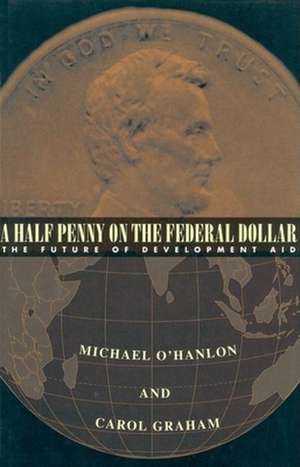A Half Penny on the Federal Dollar: The Future of Development Aid
Autor Michael E. O'Hanlon, Carol L. Grahamen Limba Engleză Paperback – apr 1997
Spending on U.S. foreign affairs, which constitutes only about one percent of the federal budget, is being sharply reduced. Under the President's 1996 budget plan, it will decline by just as great a percentage as defense between 1990 and 2002—and by substantially more than defense over the 1980-2002 period. No other major category of federal spending will undergo a real cut over either time period. The shrinking budget, totaling about $19 billion in 1997, will still have to fund the State Department, international broadcasting and educational exchanges, trade subsidies and investment guarantees for U.S. business overseas; United Nations operations including peacekeeping, and all types of foreign assistance.
In this book, O'Hanlon and Graham focus primarily on this last component of international spending. Specifically, they analyze U.S. official development assistance (ODA) to poor countries. The authors place U.S. ODA in a broad historical, international, and economic perspective. They then recommend an alternative approach to ODA for the United States as well as other donors. They favor continuing to provide humanitarian and grass-roots aid to most poor countries, but providing ODA to promote macroeconomic growth only to those countries that maintain coherent, market-oriented economic policy frameworks. The authors argue that to provide effective aid, as well as to maintain U.S. leadership in world affairs, net resources for ODA and the international account need to increase only modestly.
In this book, O'Hanlon and Graham focus primarily on this last component of international spending. Specifically, they analyze U.S. official development assistance (ODA) to poor countries. The authors place U.S. ODA in a broad historical, international, and economic perspective. They then recommend an alternative approach to ODA for the United States as well as other donors. They favor continuing to provide humanitarian and grass-roots aid to most poor countries, but providing ODA to promote macroeconomic growth only to those countries that maintain coherent, market-oriented economic policy frameworks. The authors argue that to provide effective aid, as well as to maintain U.S. leadership in world affairs, net resources for ODA and the international account need to increase only modestly.
Preț: 155.46 lei
Nou
Puncte Express: 233
Preț estimativ în valută:
29.75€ • 30.100$ • 24.63£
29.75€ • 30.100$ • 24.63£
Carte tipărită la comandă
Livrare economică 03-17 aprilie
Preluare comenzi: 021 569.72.76
Specificații
ISBN-13: 9780815764458
ISBN-10: 0815764456
Pagini: 120
Ilustrații: Illustrations
Dimensiuni: 152 x 229 x 11 mm
Greutate: 0.19 kg
Ediția:New.
Editura: Brookings Institution Press
Colecția Brookings Institution Press
ISBN-10: 0815764456
Pagini: 120
Ilustrații: Illustrations
Dimensiuni: 152 x 229 x 11 mm
Greutate: 0.19 kg
Ediția:New.
Editura: Brookings Institution Press
Colecția Brookings Institution Press
Notă biografică
Michael O'Hanlon is the director of research and a senior fellow in the Foreign Policy program at the Brookings Institution, where he holds the Sydney Stein Jr. Chair. His books include The Science of War (Princeton University Press, 2009) and numerous Brookings books.
Carol Graham is a senior fellow in the Economic Studies program and codirector of the Center on Social and Economic Dynamics at the Brookings Institution.
Carol Graham is a senior fellow in the Economic Studies program and codirector of the Center on Social and Economic Dynamics at the Brookings Institution.
Descriere
Spending on U.S. foreign affairs, which constitutes only about one percent of the federal budget, is being sharply reduced. Under the President's 1996 budget plan, it will decline by just as great a percentage as defense between 1990 and 2002—and by substantially more than defense over the 1980-2002 period. No other major category of federal spending will undergo a real cut over either time period. The shrinking budget, totaling about $19 billion in 1997, will still have to fund the State Department, international broadcasting and educational exchanges, trade subsidies and investment guarantees for U.S. business overseas; United Nations operations including peacekeeping, and all types of foreign assistance.
In this book, O'Hanlon and Graham focus primarily on this last component of international spending. Specifically, they analyze U.S. official development assistance (ODA) to poor countries. The authors place U.S. ODA in a broad historical, international, and economic perspective. They then recommend an alternative approach to ODA for the United States as well as other donors. They favor continuing to provide humanitarian and grass-roots aid to most poor countries, but providing ODA to promote macroeconomic growth only to those countries that maintain coherent, market-oriented economic policy frameworks. The authors argue that to provide effective aid, as well as to maintain U.S. leadership in world affairs, net resources for ODA and the international account need to increase only modestly.
In this book, O'Hanlon and Graham focus primarily on this last component of international spending. Specifically, they analyze U.S. official development assistance (ODA) to poor countries. The authors place U.S. ODA in a broad historical, international, and economic perspective. They then recommend an alternative approach to ODA for the United States as well as other donors. They favor continuing to provide humanitarian and grass-roots aid to most poor countries, but providing ODA to promote macroeconomic growth only to those countries that maintain coherent, market-oriented economic policy frameworks. The authors argue that to provide effective aid, as well as to maintain U.S. leadership in world affairs, net resources for ODA and the international account need to increase only modestly.
